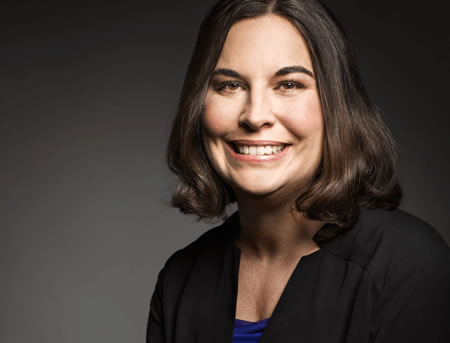Redfin CTO uses data to re-think real estate
After spending nearly a decade working at Boston-area software companies, Bridget Frey, A.B. ’99, found herself preparing for a cross-country move to Seattle. With each twist of the real estate process, she became more frustrated by the challenges of selling a home and buying a new one in an unfamiliar city.
“I was just blown away by how much data was involved and how much information a person needs to gather to make home-buying decisions, especially in a brand new area,” said Frey, a computer science concentrator at the Harvard John A. Paulson School of Engineering and Applied Sciences. “It became clear to me that people really do need help to navigate the real estate process.”
Frey worked with a Redfin agent to complete both real estate transactions and was impressed by the tech-driven company. Her experiences traversing the tumultuous housing market of the Pacific Northwest inspired her to pursue a position at Redfin, whose CEO she knew from a previous position at a software startup. Shortly after relocating to Seattle in 2011, Frey joined the firm as director of analytics engineering.
She quickly found a niche at the growing company, drawing on her expertise in software engineering and data systems, and was named chief technology officer last year.
“Real estate is a fraught process because there is so much more involved in moving to buy or sell a new home,” she said. “People feel pressure to find the right home in the right neighborhood, at the same time there is some major event going on in their lives that is causing the move.”

Redfin CTO Bridget Frey, A.B. '99 (computer science) uses data to simplify and streamline the real estate process. (Photo provided by Redfin.)
At Redfin, Frey has led the development of several tech-forward features designed to simplify the home-buying process. The company’s “Book It Now” feature, for instance, lets individuals schedule a home tour on-demand, which could give customers an edge in competitive real estate markets.
By collecting information about a customer’s tastes and interests, and then pairing that data with information about available homes, the firm’s software engineers also provide distinctive insights for agents.
The long-term relationships those agents build with their clients pose unique challenges for a software engineer, Frey said.
“We need to take a fundamentally different approach to our software development, since this is not just a transactional process. People don’t just visit our website, buy something, and then leave,” Frey said. “We need to have balance, designing features that bring people back to the website while, at the same time, helping them work more closely with their agent.”
To that end, Redfin’s software engineers often get out into the field, shadowing agents to learn about the process on the front lines of real estate, while keeping up with market trends.
That balance of customer service and data analytics is paying off. When Frey joined Redfin, the company was serving 19 U.S. metro markets; now the company is in more than 80 markets.
“The way real estate works across the U.S. is very different, especially when comparing major coastal cities with mid-sized cities or rural areas,” she said. “By integrating all the real estate data from every city and county in the U.S. into a unified piece of technology, we are able to create a single user experience no matter which city our customers are moving to.”
That customized experience helps customers save time when searching for homes. Building off that success, her team is currently focusing on other ways to use data and software to shave time off some of the more drawn out steps in the real estate process.
For Frey, a software engineer at heart, managing a growing team of engineers presents its share of challenges. But she thoroughly enjoys the collaborative nature of each project, and draws inspiration from the potential to help people have a better real estate experience.
“I love being able to work on complex problems that are difficult to solve and involve pursuing a lot of different angles,” she said. “Computer science is such a great field for exercising that muscle and tackling those kinds of problems.”